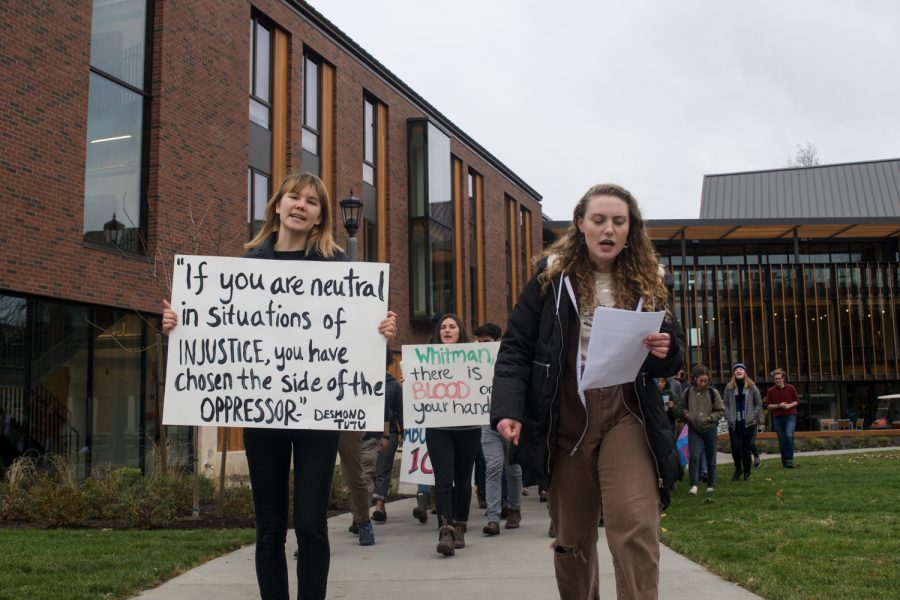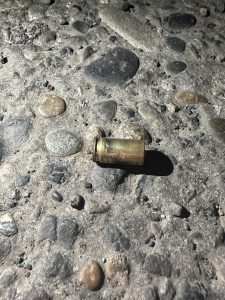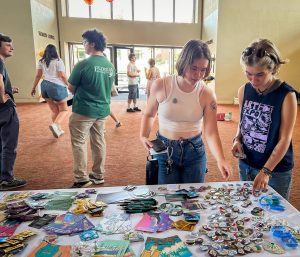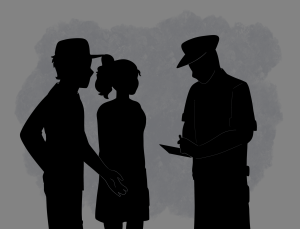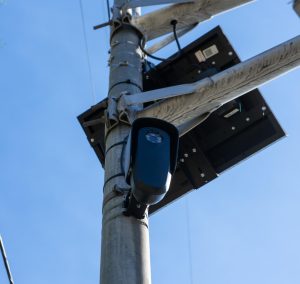Considering the Next Steps Towards Divestment
November 12, 2018
On Friday, Nov. 9, students gathered outside Memorial building to protest divestment as the Board of Trustees arrived for their annual fall meeting. By lunchtime the Board had unanimously voted to divest from the top 200 fossil fuel companies.
First year Karsten Beling joined Divest club at the beginning of the year.
“I was at lunch at Cleveland, I was in the middle of getting my banana chai and I got the text [about the Board divesting],” Beling said.
“There’s been a lot of first years who have been very engaged with this and…coming in we didn’t think it would pass…and we thought we’d be working on this for our four years here,” Beling said.
Divest Club began in 2013. Prior to this year, it had asked the Board for divestment twice. Both were met with negative responses. The first proposal asked for total divestment from fossil fuels which make up about 6.6 million of Whitman’s endowment. The second proposal asked for Whitman to cap their investments in fossil fuel to 1 percent of the endowment. A third proposal asked for a response to the 1 percent cap request after a year of inaction from the Board.
Senior Genean Wrisley worked to promote both the one percent proposal and the most recent proposal.
“For [the one percent request] I had a meeting with the then-chair of the Board, Brad McMurchie, and I remember him looking at Dani Hupper, who was a revolutionary divester, and he looked at her — and I’m pretty sure this is quoted exactly — he said ‘What if the answer’s just no, Dani? What if it’s just no?” Wrisley said.
This past spring, Divest Club submitted another proposal for the Board to divest from coal. According to a new Board policy they must vote on divestment proposals within two meetings, which happen three times a year. After delaying the vote during the spring meeting, the Board was required to vote on the proposal during this meeting.
Senior Tyee Williams was prepared for another negative response from the Board of Trustees.
“The past two years even it seemed like divestment was struggling,” Williams said. “We didn’t have that many people who were engaged, and we had a couple events that were bigger but… we didn’t have that much optimism because we had been shut down a lot…. And then come this year, there were a lot more energy, a lot people and just a big push.”
Leading up to the vote, Divest Club worked to raise awareness of the issue among the students and make it visible to the Board.
“[We did] a lot of chalking, postering literally everywhere,” Beling said. “But one of the bigger things I worked on was Dorms and Divestment which was essentially, well it was Sam Kinzel’s original idea…but essentially it was going around to all of the dorms on campus… and talking to the people who lived there about divestment, seeing if they cared about it and if we could use their windows to write divestment messages.”
Beling, first year Sam Kinzel, and others painted windows in Jewett and Anderson the weekend before the Board meeting would take place. There was support for the project in other dorms but the screen and window configuration prevented the painting.
“One of the requirements for divestment is that it is ‘shocking to the conscious’ which is really really vague and weird terminology that [the Board] probably used to their advantage multiple times,” Kinzel said. “But we really wanted to show that our conscious was shocked as a student body, so we just got a lot of people on board and started painting windows.”
While the Board has pledged to divest from the top 200 fossil fuel industries, it won’t happen immediately. Whitman’s endowment is invested by managers whom the college hires and it will take time to get the managers on the same page, then remove the money from these companies.
The endowment is also invested in other problematic industries and Divest Club believes that they must broaden their scope.
“I’m pretty sure they’re invested in guns, I know they’re invested in prisons and pipelines, and I also think they’re invested in tobacco,” Wrisley said. “So we have some research to do about where we want to move [Divest Club’s focus], but also trying to support other groups on campus that are working on divestment.”
Borders Without Methods, BAM, is a group on campus also affected by divestment issues. During last week’s (Im)migration Week, Divest club held a lunch conversation about how climate change and the actions of the global north affect refugees.
“[BAM] has been so wonderful to teach people like me, that didn’t see all the cross-sections, to see where our goals and our issues really over-lapped and where we’re fighting for the same thing,” Kinzel said.
Whichever direction Divest club goes, Wrisley hopes this response from the Board will help motivate further change.
“I think that this is so huge, a lot of the seniors who have been here haven’t seen a positive response in things that we’ve directly asked for from administration,” Wrisley said. “And it makes me really excited because this first year class is by far the most engaged, energized, passionate, radical, excited people that I’ve ever met and I’m so excited that they get to experience a ‘yes’ based on direct hard work and action.”



